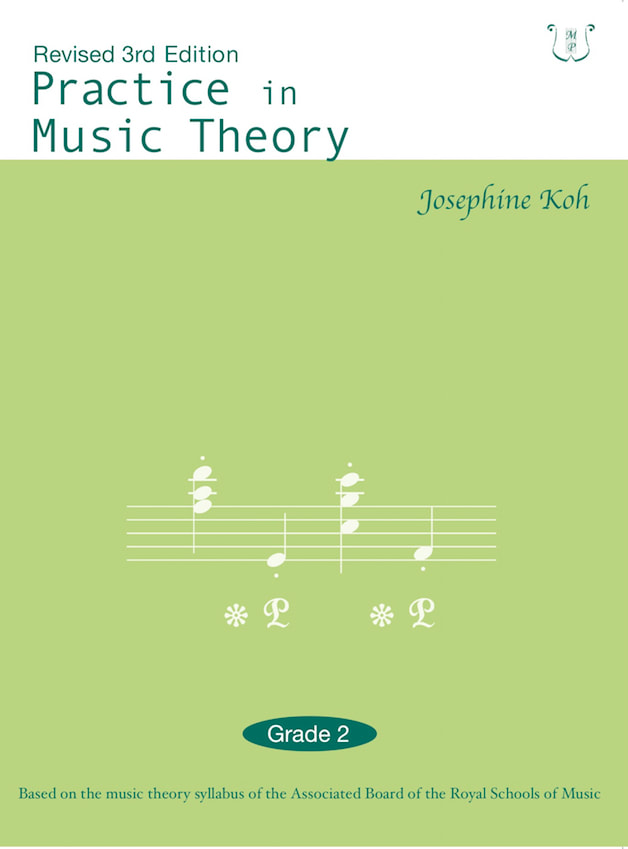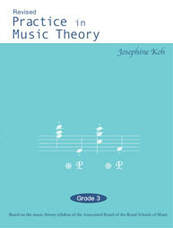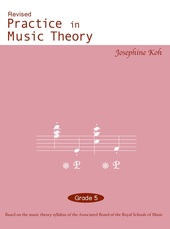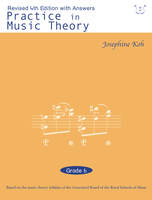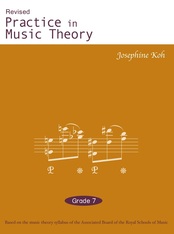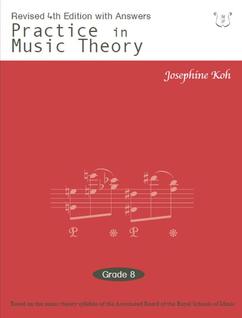Home I About Us l Contact Us
Practice in Music Theory (Grades 1 to 8)
by Josephine Koh
This comprehensive series of graded theory workbooks based on the ABRSM theory syllabus is specially designed to present music theory with a simple and logical approach. Explanatory notes accompany each topic, introducing basic theoretical concepts with ample exercises to reinforce the concepts learnt. Topically arranged to facilitate systematic learning, teaching points are tabulated for quick reference and easy revision. A specimen test also presents the ABRSM examination format.
This series is the complete guide to music theory!
This series is the complete guide to music theory!
Practice in Music Theory Grade 1 (4th Edition)The first of the series of graded theory workbooks based on the ABRSM theory syllabus, it is an ideal workbook to build the foundation in music theory. The exercises are specially designed to present music theory to early learners using a simple and logical approach.
Recommended to be used with Rhythmatics. Available in English |
Practice in Music Theory Grade 2 (3rd Edition)The second grade of the Practice in Music Theory series, this workbook is based on the ABRSM theory syllabus. It is highly recommended for students who have completed Grade 1 theory. The teaching methodology employs a simple and logical approach. It serves to progressively develop the interest of learners in music theory.
Recommended to be used with Rhythmatics. Available in English |
|
OUT OF STOCK
|
Practice in Music Theory Grade 3The third grade of the Practice in Music Theory series is based on the latest ABRSM syllabus and examination requirements. A highly successful workbook for students, the teaching methodology presents musical concepts of scales, time signatures, key signatures and other topics using a simple and logical approach.
Available in English, Chinese (Traditional & Simplified), German |
|
Practice in Music Theory Grade 4 (6th Edition with Answers)
The fourth grade of the Practice in Music Theory series is highly recommended for those who are making good progress in their early musical studies. The J Koh's teaching approach is academic and logical, yet musically conceived. Progressive topics are set out to guide students through their understanding of the fundamental musical concepts and ideas, including rhythmic writing and musical analysis. Available in English, Chinese (Traditional & Simplified) |
Practice in Music Theory Grade 5 ((4th Edition with Answers)The 5th grade of the Practice in Music Theory series completes the journey of students who have been on the course of understanding the rudiments of music theory. The J Koh's teaching approach is academic and logical, yet musically conceived to provide students with a strong theoretical foundation. Progressive topics are set out to guide students through the learning process, including setting words to music and transposition.
Available in English, Chinese (Traditional & Simplified) |
Practice in Music Theory Grade 6 (4th Edition with Answers)This revised 4th edition of Practice in Music Theory Grade 6 comes complete with detachable Model Answers! The success of its previous editions for the past two decades has prompted the need for more definitive solutions. Based on the ABRSM theory examination syllabus, it is the first of three comprehensive coursebooks leading to Grade 8 and beyond. There are 2 parts to this course book.
Part I – Harmony The principles of harmony are introduced here: 4-part writing, 2-part counterpoint, concepts of traditional chord progression, use of inversions, principles of voice-leading, and the use of non-harmony notes. Harmonic guidelines and rules are clearly explained with relevant examples. Exercises are progressively structured to ensure a strong grasp of the theoretical concepts. Part II – Melodic Composition and Analysis Meloic composition is taught through an analytical approach. The concepts of phrasing, use of motifs, modulations and melodic contour are illustrated with authentic extracts. By taking students through the works of the great masters, their technical skills are sharpened, enhanced with useful tools for the creative compositional process. Skills in score analysis involve the acquisition of sound musical knowledge - the study of forms, genres, history of western music that spans 4 centuries, along with the composers’ works and styles. Appendices II and III provide guidance for basic research needed at this level. Available in English |
Practice in Music Theory Grade 7(4th Edition with Answers)In this second level comprehensive course book for advanced students, Practice in Music Theory Grade 7 continues with the exploration of complex harmonic and melodic concepts. The study of chromatic harmony includes the diminished 7th, the Neapolitan 6th, and the secondary dominants. Figured bass and non-harmony notes are explained in context with adequate musical examples. The demands of the syllabus are laid out in structured topics, in which students are trained progressively to handle challenging questions.
Available in English |
Practice in Music Theory Grade 8 (4th Edition with Answers)In this last and comprehensive coursebook in the Practice in Music Theory series, the author has skillfully put together the demands of the syllabus in an enlightening style for both teachers and music students. The book is organised into 5 sections - Advanced Harmonic Vocabulary, Trio Sonata Textures, Pianoforte Writing, Melodic Composition, Score Reading and Analysis. Each section contains topics which provide the indispensable background to understanding the concepts found in music itself. Theoretical considerations apart, specific works are analysis, illustrations are abundant, musical examples and interesting exercises are plentiful throughout the book.
Available in English |

